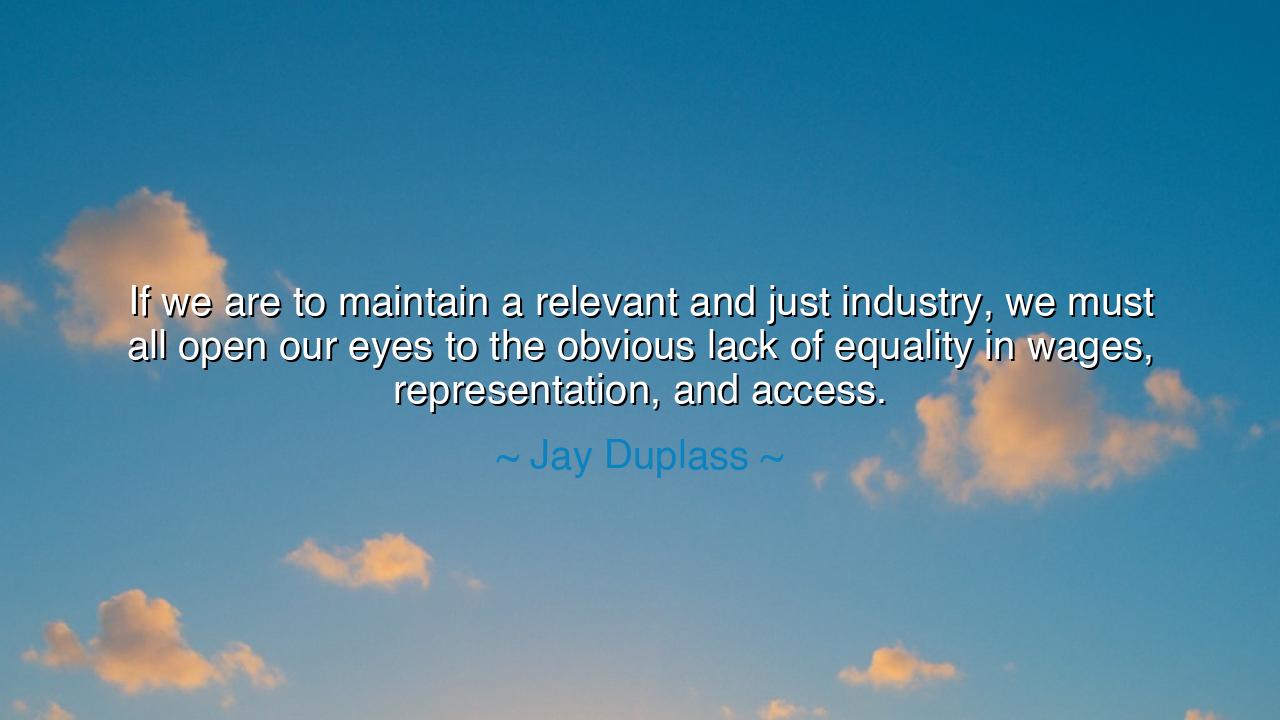
If we are to maintain a relevant and just industry, we must all
If we are to maintain a relevant and just industry, we must all open our eyes to the obvious lack of equality in wages, representation, and access.






"If we are to maintain a relevant and just industry, we must all open our eyes to the obvious lack of equality in wages, representation, and access." These words, spoken by Jay Duplass, call on us to confront a harsh truth—the inequality that permeates industries, particularly in terms of wages, representation, and access. To have a just and relevant society, we must not turn a blind eye to the inequities that persist in the structures that shape our world. For Duplass, the industry he speaks of may be the world of entertainment, but the lesson he imparts reaches far beyond that. It is a call to action for all who believe in the fairness of a just society: we must actively recognize and address the ways in which some are denied opportunities, while others thrive without merit or regard for equality.
In the ancient world, inequality was often justified by societal norms and rigid hierarchies. Ancient Greece, though considered the cradle of democracy, excluded vast swaths of people from full participation in society. Women, slaves, and non-citizens were denied the rights and privileges afforded to the elite male citizens of Athens. The philosopher Aristotle, while laying the groundwork for Western thought, believed that some people were "naturally" suited to be rulers, and others to be ruled, echoing the divide between the privileged and the oppressed. Yet even in this unjust system, there were voices like Socrates, who questioned the inherent assumptions of his society, arguing that true justice could only exist when equality was afforded to all. His ideas ignited a spark for future generations that would not rest until all people were given the equal opportunities they deserved.
Jay Duplass’s statement is not just a critique; it is a call for reflection and action. Inequality in wages, representation, and access is not just a matter of numbers—it is a matter of justice. When the entertainment industry or any other field fails to provide equal opportunities, it perpetuates a system of exclusion and oppression that denies individuals the chance to participate based on their merit, rather than their background or identity. In Hollywood, for instance, women, people of color, and marginalized groups have long faced barriers to equal representation both in front of and behind the camera. Duplass’s words challenge us to look beyond the surface and recognize the systemic issues that limit the true potential of the industry.
Consider the rise of women in cinema, particularly in the context of Hollywood's Golden Age. Despite the growing talent of female filmmakers, women were often relegated to secondary roles, while male directors, producers, and screenwriters held the lion’s share of power. It was not until the 1970s, with pioneers like Barbara Streisand and Elaine May, that women began to challenge these boundaries. Streisand, in particular, became a trailblazer, not only as an actor and singer but as a director and producer, defying the industry’s rigid gender roles. Her success was not simply a personal victory—it was a victory for the representation of women in a space where they had long been excluded. The fight for equality in Hollywood, however, continues today. As Duplass points out, if we are to maintain a relevant and just industry, we must actively acknowledge and address these imbalances.
The lack of equality in wages is another glaring example of systemic injustice. In the entertainment industry, this disparity is often most visible when comparing the earnings of male and female actors for similar roles. Meryl Streep, one of the most celebrated actresses of all time, has spoken about the pay gap between male and female actors, despite her immense talent and success. This inequality is not confined to Hollywood—it permeates many industries, from sports to corporate sectors, where women often earn a fraction of what their male counterparts earn for doing the same work. The inequity in wages not only harms the individuals directly affected but sends a message that their work and talent are not as valuable, a message that is passed down to future generations.
Jay Duplass’s call to open our eyes is more than just an invitation to see the problem; it is a call to action. Equality requires not only that we recognize injustice but that we actively work to dismantle the systems that perpetuate it. This requires courage, resilience, and the willingness to be uncomfortable. Whether we are in positions of power or not, we all have a role to play in creating a world that values equality. We must speak out against disparities in wages, fight for equal representation in media, and ensure that access to opportunities is not limited by one’s gender, race, or background. By doing so, we contribute to a relevant and just society—one that recognizes the inherent worth of every individual.
The lesson of Duplass’s words is this: inequality is not a passive issue. It is an active injustice that demands our attention and action. If we are to move forward as a society, we must not only call for change but participate in that change. This requires a willingness to challenge the status quo, to recognize the inequities that exist, and to act boldly in the fight for justice and equality. Whether through our roles as consumers, creators, or allies, we must contribute to the ongoing work of creating a world where everyone, regardless of their identity, is given the equal respect and opportunity they deserve. In this fight, we are not merely securing the future for ourselves but for the generations that will follow us, ensuring that equality is not a fleeting ideal, but a living reality.






AAdministratorAdministrator
Welcome, honored guests. Please leave a comment, we will respond soon